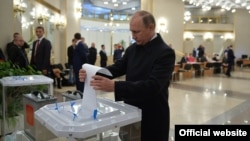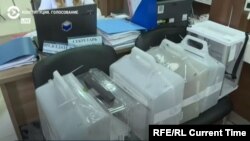Based on preliminary results, Russian voters appear to have approved 206 constitutional amendments that could, among other changes, enable President Vladimir Putin to stay in office until 2036.
With 27.15 percent of polling-station protocols counted, 72.92 percent of the vote backed the amendments, 25.84 percent opposed them, the Central Election Commission stated on the evening of July 1. Turnout was placed at 65 percent of Russia’s roughly 144 million voters.
Already, in the early evening, a small crowd of voters angry at the vote’s conduct had begun to form in downtown Moscow’s Pushkin Square. Holding posters, some denounced a continuation of Putin’s rule; others took issue with staging a national vote during the coronavirus pandemic. Police detained several people who lay down on Red Square to form the number 2036 – the year when Putin can no longer run for president, under the revised constitution.
Getting Russian voters, whether online or offline, to take part in this milestone June 25-July 1 vote was the main challenge facing both the government and election officials, vote monitors, analysts, and other local observers have underlined. A turnout of more than 50 percent was needed for the government’s proposed constitutional changes to go into effect.
“Without a doubt, if the turnout is rather low, it won’t give that legitimacy [to the vote] that’s very much desired,” commented political scientist Olesya Zakharova. The government needs for the amendments to be approved “with a certain ‘Hurrah!’” she said.
Government supporters now believe they have that, but opposition activist Dmitry Gudkov, a former State Duma deputy, rejected the preliminary results out of hand, noting that individuals not approved by the government-associated Public Chamber could not serve as election observers.
In a July 1 interview on the government-run Rossia-1 TV station, Central Election Commission chairwoman Ella Pamfilova asserted that there had been no serious violations at all during the week-long vote – a finding that echoes President Putin’s earlier emphasis on the need for a clean vote.
But, nonetheless, voting irregularities were systematically reported throughout the country.
In St. Petersburg, a journalist for the independent outlet Mediazona, David Frenkel, alleged that police in a polling station had pushed him to the ground, breaking his arm, as he followed up on reports of voting violations on June 30. The police have denied any abuses. An investigation is ongoing.
In Moscow, election officials or other polling station personnel preventing observers and senior election commission officials from accessing election documents appeared to be “the most serious” violation, Golos coordinator Dmitry Nesterov commented. Some individuals, he said, cited a non-existing regulation that copies of the documents can only be given out within 10 days after receipt of a written application.
The Moscow City Election Commission’s response that such documents should be made readily available appeared to go unnoticed, he added.
Golos has identified instances of falsified ballots in 10 city districts, Nesterov said. A desire to conceal potential vote-fixing could explain the reluctance to share election documents with observers, he alleged.
The Presidential Council for Civil Society and Human Rights, however, has condemned “more than 90 percent” of Golos’ reports as false.
But falsified ballots for home voting in the Moscow district of Ramenki prompted election officials to throw out all the ballots for two polling stations on June 30.
In the downtown Moscow polling station no. 3412, Current Time correspondent Aleksei Aleksandrov detected that voting containers had been closed with tape, but neither signed nor sealed. At the urging of Moscow City Council member Yevgeny Stupin, who explained the procedure, an election commission member eventually agreed to place her signature on the containers to prevent falsification of the vote.
Similar situations were reported on social media across the country. With voting occurring everywhere from online to outdoors to avoid COVID-19 infections, no detail-oriented, coordinated strategy appeared to exist to guarantee that such problems did not arise.
Two hours to the east of Moscow, in the regional seat of Yekaterinburg, a city of some 1.4 million people that posted one of the country’s lower voter turnouts (around 45 percent), routine “massive compulsory voting” by state employees was the most significant violation, commented Golos activist Aleksandr Grezev, who, along with 29 volunteers, alleged that violations had been detected each day of the vote.
The liberal opposition party Yabloko has made available an audio recording in which a woman, allegedly the vice-principal of a Yekaterinburg school, can be heard instructing employees to vote, warning them that trying “to cheat the system will not work out.”
“If you don’t vote, your last name will be highlighted in red,” the woman, identified as Tatyana Parkhomenko, said, apparently referring to a list of employees. Parkhomenko, whose voice resembles that in the recording, denied that she had ever forced employees to vote.
Yabloko considers the Yekaterinburg incident to be “at a minimum, unlawful.” Golos plans to detail its findings to the Central Election Commission at the end of voting.
Reports about state-funded institutions urging employees to vote on certain dates or at certain locations, and to inform their management when they had done so, occurred throughout Russia in the runup to the start of voting on June 25.
Many voters, though, appeared to have little information at all about the vote.
“Before I go to vote, I should know for what I’m voting,” observed Sergei, a 60-year-old resident of Constitution Street in the town of Podporozhe, not far from the Finnish border. Spewing profanities, he said he had no plans to vote.
Polling stations in both Moscow and St. Petersburg sometimes lacked the amendments’ text, even though bookstores ahead of the vote had sold copies of the 1993 constitution with the proposed amendments already included.
At the school near Podporozhe's Constitution Street that doubled as a polling station, volunteers had set up a photo display about the changes, somewhat akin to a social-studies-fair exhibit. They also handed out stickers, which depicted the future, families, the environment, and children, but not the proposal to reset the clock on President Putin’s time in office or other controversial amendments.
Sergei said he only learned on July 1 that one of the amendments could keep the president in office past 2024. Angry at Putin for increasing Russian men’s age of retirement to 65, he ultimately decided to head to the polls to reject all the amendments.
Another voter from Constitution Street, however, took the opposite tack: “I consider that only he can be our president,” an elderly woman in a white sun hat commented to Current Time’s Yury Baranyuk, in reference to Putin. “For now, we don’t have any other candidates. For now, war does not threaten us. And if it does, he’ll stand up for us.”
Some voters put that opinion into song. At an outdoors polling station in the town of Torzhok, a few hours’ drive northwest of Moscow, elderly women seated across from a voter-registration table sang out for voters to choose “tomorrow’s bird of happiness,” an apparent reference to President Putin, whom many expect to run for reelection in 2024.
Whether local election officials responded to the video, posted on Facebook by opposition leader Aleksei Navalny, was not immediately clear.
On June 30, President Putin urged Russians to take part in the vote, saying that “We’re voting for the country in which we want to live.” He did not express an opinion about the amendment that now will allow him to run for two more terms as president.







